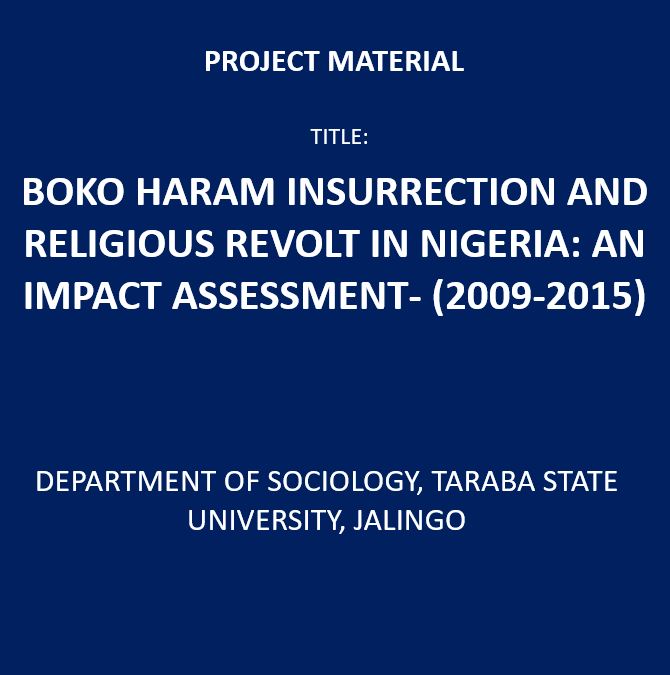No products in the cart.
Boko Haram Insurrection and Religious Revolt in Nigeria: An Impact Assessment- (2009-2015)
₦10,150.00
BOKO HARAM INSURRECTION AND RELIGIOUS REVOLT IN NIGERIA: AN IMPACT ASSESSMENT- (2009-2015)
- NUMBER OF PAGES: 44
- FILE TYPE: DOC
- DEGREE: BACHELOR
- INSTITUTE: DEPARTMENT OF SOCIOLOGY, TARABA STATE UNIVERSITY, JALINGO
ABSTRACT:
Evident by incessant and sporadic attacks on Nigerians poise a serious threat to the unity of Nigeria, and secondly, the single biggest security nightmare to confront Nigeria since after amalgamation of the Southern and Northern protectorates by the British colonialist in 1914 is“Boko Haram” a terrorist organization also known as “Jama’atul Ahli Sunnah Lidda’wati wal Jihad,” or “people committed to the propagation of the Prophet’s teachings and jihad.” The sect also upholds an ideology translated as “Western Education is forbidden,” or rejection of Western civilization and institutions. By some estimates, more than 5,500 people were killed in Boko Haram attacks in 2014, and Boko Haram attacks have already claimed hundreds of lives and territories (caliphates) in early 2015. In total, the group may have killed more than 10,000 people since its emergence in the early 2000s. More than 1 million Nigerians have been displaced internally by the violence, and Nigerian refugee figures in neighboring countries continue to rise. This paper is predicated on secondary sources of data and anchored on the social identity theory. As such, the paper argued that the rise of Boko Haram with its violent disposition against Western values is a counter response to Western civilization that is fast eclipsing other civilizations. The paper posits that the Boko Haram insurrection going by its teachings, and destruction of churches is a validation of the propagation of the sect as a religious revolt which has resulted in dire humanitarian situation in Adamawa, Borno, Yobe, Bauchi and Gombe states all in north eastern Nigeria as evident in human casualties, human right abuses, population displacement and refugee debacle, livelihood crisis, and public insecurity. The paper submits that the Nigerian state should muster the needed political will in terms of a viable anti-terrorism measures and build strong legitimate institutions that can adequately curb the menace of corruption that has engulfed the military hierarchy, respond proactively to the challenge of terrorism in Nigeria and should embrace a strategic paradigm shift from anti-terrorism to counter-terrorism as a strategy for containing the crisis that today threatens the secular status of Nigeria.
Key Words: Boko Haram, Civilization, Fundamentalism, Islam, Religion, Revolt.
- ₦10,150.00

